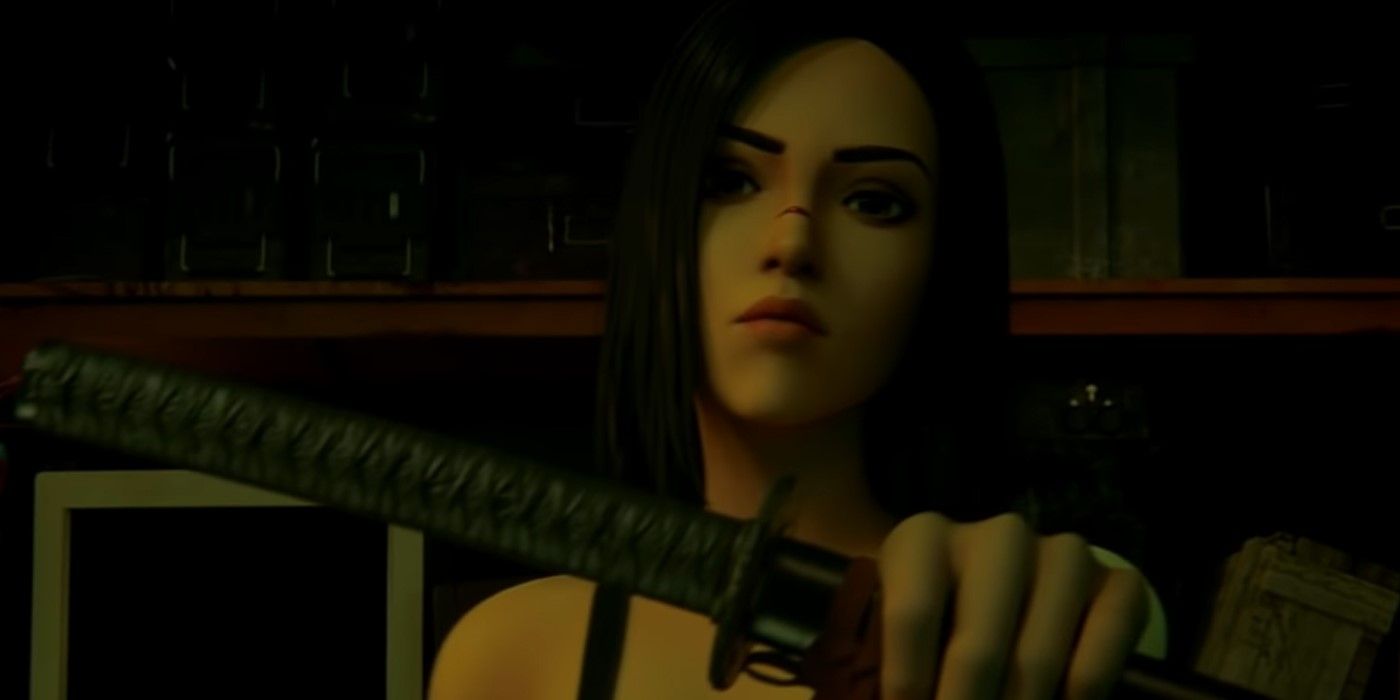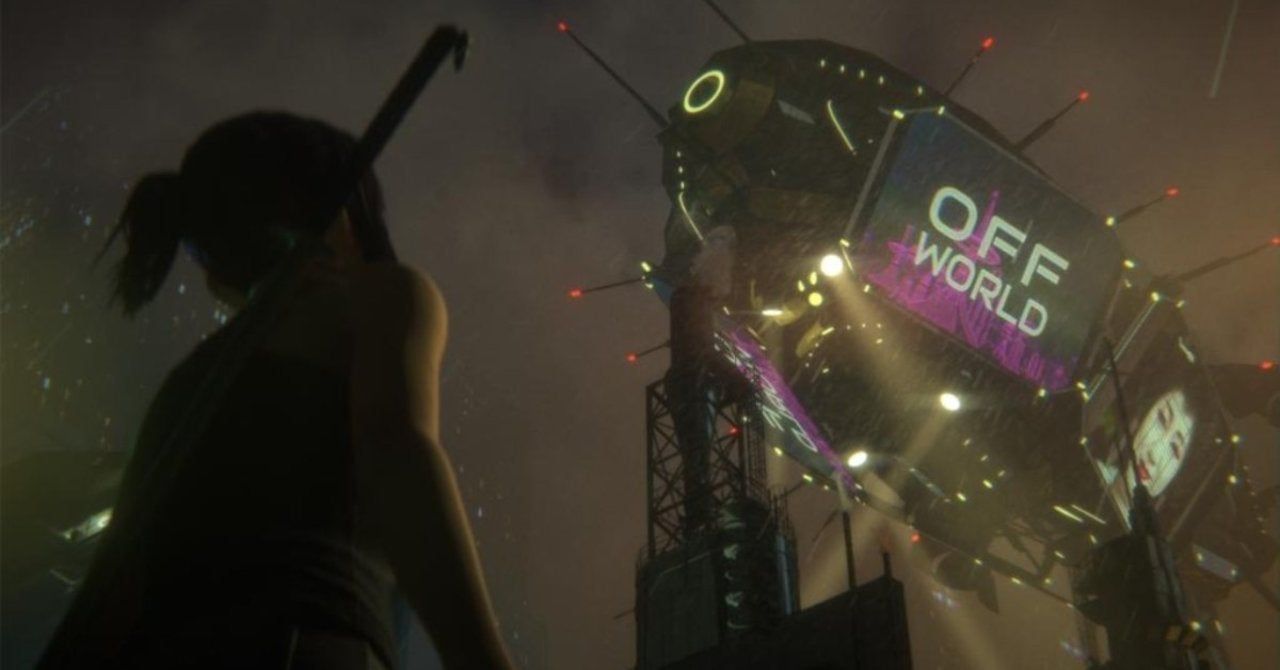
TV Review: Blade Runner: Black Lotus S1E1: “City of Angels”
Blade Runner: Black Lotus was an anime series that had fell underneath my radar for some time, and I had honestly forgotten about it by the time it released. In retrospect, that was an enormous error, because the creators of this series deserve more respect than that. Shinji Aramaki and Kenji Kamiyama have a very strong background in science fiction and cyberpunk, between them including such credits as “The Ninth Jedi” from Star Wars: Visions, Ghost in the Shell, Appleseed, Evangelion, Patlabor, Ultraman, Bubblegum Crisis, and other anime SF classics. This is not even their first association with Blade Runner as a franchise; Aramaki was a designer on Blade Runner: Black Out 2022. So it’s unfortunate that their contributions to a legendary Western SF franchise like Blade Runner have gone so overlooked, because it’s perfectly matched to creators with such deep experience in cyberpunk.
Blade Runner: Black Lotus centers on a young woman named Elle, who awakens with no memory of her past and a piece of advanced technology she doesn’t understand. The amnesiac hero isn’t new to science fiction, but it works reasonably well for this story. It’s implied quite strongly that Elle is a replicant, and that her impossibly good combat skills are probably due her to being designed as a combat model replicant. That approach works for a series like this, since memory is tied closely to identity; identity, especially the difference between human and machine, strikes at the core themes of Blade Runner. It also works well in terms of the film noir elements of the series, since Elle’s past gives her a mystery to solve. She is given the mystery of her past, obligating her to solve the mystery as she discovers who she is as a person. That is a perfectly reasonable starting point for Elle’s story, and the episode gives enough mystery to make the viewer care about her and her past. There are loose connections with elements from Blade Runner 2049, especially with the characters of Niander Wallace and Doc Badger, as well as the fact that the story is set between the two films. At the same time, Black Lotus feels like its own story, and not deeply connected with the main stories of the films.

The animation is visually striking if not technically flawless, but where it succeeds it does very well indeed. One area where this series does extremely well is in capturing the visual flavor of the Los Angeles from the Blade Runner films. One point that the creators focused on was on the lighting and the neon world of the future, and here it shines. There is a clear attention to detail that echoes the classic films. This comes across nicely in the flying ad about the off-world colonies and the cultural hybrid between East and West with the individual buildings and street lights. The Japanese influence makes those elements stronger, especially during the street battle between Elle and the gang members. There is a stylishness that fits the flair of the series at times too. At the same time, there are other elements that feel relatively flat, such as the desert scenes; these often feel lifeless compared to the city scenes. The lighting there is much more subdued, lacking the bright red-oranges and the dismal haze of Villeneuve’s wasteland in Blade Runner 2049. There’s an emptiness there, and not in a way that feels intentional, but because the focus was directed more strongly on the city environments. There are also moments where characters’ mouths don’t quite move right or in time with the characters’ lines; this isn’t too frequent, but it can be occasionally noticeable. To be fair, it’s possible that it works better with the Japanese voices, so it may be worth watching it with English subtitles.
The voice acting is quite solid, though we don’t see the full cast in this episode just yet. Jessica Henwick is an inspired choice for Elle, and it’s quite possible she could even play the character in live action. Henwick is an actress with a decent amount of range, having done strong action roles in the Netflix Marvel shows as well as The Matrix Resurrections. Henwick grasps the disorientation and confusion that Elle would naturally have, but she slips into the action heroine role easily at the right moments. She brings the right amount of strength and vulnerability to the character, and that makes Elle more endearing to watch in this show. The only other significant character in this episode is Doc Badger, a tech supplier played solidly by Barkhad Abdi, reprising his role from Blade Runner 2049. Badger has a more subdued tone with moments of intensity, coming across as someone who’s grown tired of being victimized by the local street gang. He interacts well with Henwick as Elle, filling the role of the heroine’s sidekick nicely. The other characters are good in their roles, though none with too many significant lines. Still, I look forward to hearing more from Wes Bentley as Niander Wallace, since he seems thus far to have a good grasp of Jared Leto’s character from Blade Runner 2049.

I appreciate that the Blade Runner franchise is being handled with a more measured hand in an age of constant sequels and reboots. At least so far, it seems like Blade Runner is being revisited relatively infrequently, with clear ideas from proven talents who care about the material. Although Black Lotus has room to grow from this first episode, it’s engaging enough at this point, and it ties in reasonably well with the main ideas of the series. As things stand, Black Lotus starts on a positive note, leaving just enough mystery to come back for more.
Score: 4/5
Directors: Shinji Aramaki and Kenji Kamiyama
Writer: Eugene Son
Cast: Jessica Henwick, Barkhad Abdi, Will Yun Lee, Charles Halford, Wes Bentley
Author Profile
- Steve Sellers had been a fan of superheroes ever since Superman: The Movie. But it took the JSA, the Legion of Super-Heroes, Dragonlance, Lord of the Rings, Twilight Zone, and Chris Claremont's legendary run on the X-Men to make him a writer and a longtime fan of comics, fantasy, and science fiction. Steve is the co-creator of WHITE DRUID & MICHAEL NERO and GUARDIANS OF ELAYIM for Omen Comics, and he is also the creator of BLITZ and SHOCKWAVE for Revelation Comics (an imprint of Omen Comics).









